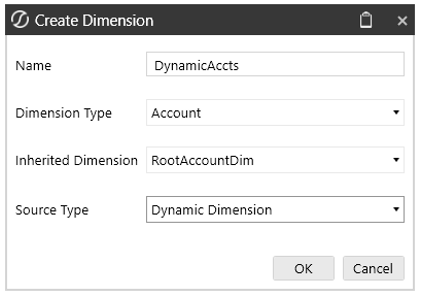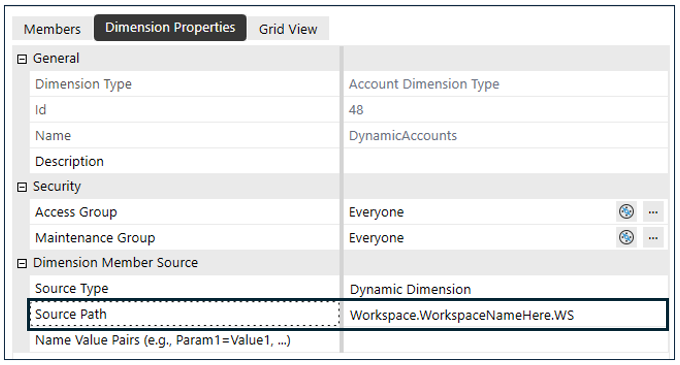Dynamic Dimensions are created for “right-hand” Account-type dimensions only: Account, Flow and User-Defined 1 through 8.
The dimension is created and assigned a Source Type of Dynamic Dimension in the Create Dimension dialog box for the Source Type property.

You can create and define members using a Workspace Service Factory, which is referenced through a workspace in the Source Path property. See Workspaces > Configure the Service Factory in the Design and Reference Guide for more information.

Capabilities
Dynamic Dimensions support the following functions:
-
Enrichment of metadata using all OneStream properties.
-
Extensibility is fully supported and integrated.
-
Members are supported in Sparse Row Suppression.
-
Can be extracted for use as a standard dimension.
Limitations
Consider these limitations when using Dynamic Dimensions:
-
Dynamic dimensions are not available on data unit dimensions..
-
When writing to standard cubes or consolidating dynamic cubes, dynamic dimensions store records in data record tables. Redefining these dimension members will not clear stored data records; however, if a member is recreated with the same member ID, the records will continue to work properly. Specify external member IDs to help maintain references.
-
Dimension members created by mirroring an existing dimension are created with new member IDs.
-
Dynamic members that are removed or no longer exist, do not populate as orphan members. Dynamic members that are defined but not linked to any parent, will appear as orphans.
-
DynamicCalc formulas on members are not supported when defined within a dynamic dimension.
-
Standard dimensions should never be extended from dynamic dimensions. Extending a dynamic dimension with another dynamic dimension is possible, but not recommended.
Recommendations
Consider these recommendations when using Dynamic Dimensions:
-
Extensibility designs are only supported as dynamic dimensions extend from standard stored dimensions.
-
Use naming conventions to clearly identify that a dimension is dynamic.


